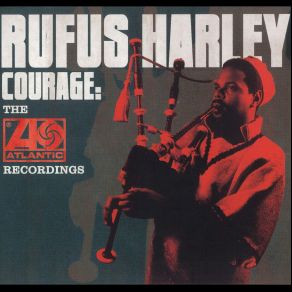Courage: The Atlantic Recordings
Download links and information about Courage: The Atlantic Recordings by Rufus Harley. This album was released in 2006 and it belongs to Jazz, Rock genres. It contains 28 tracks with total duration of 02:37:19 minutes.

|
|
|---|---|
| Artist: | Rufus Harley |
| Release date: | 2006 |
| Genre: | Jazz, Rock |
| Tracks: | 28 |
| Duration: | 02:37:19 |
| Buy it NOW at: | |
| Buy on iTunes $14.99 | |
| Buy on Amazon $14.49 | |
| Buy on Songswave €2.22 | |
| Buy on Songswave €2.24 | |
Tracks
[Edit]| No. | Title | Length |
|---|---|---|
| 1. | Bagpipe Blues | 2:41 |
| 2. | Kerry Dancers | 6:05 |
| 3. | Who Can I Turn to? (When Nobody Needs Me) | 3:58 |
| 4. | More | 6:40 |
| 5. | Chim Chim Cheree | 2:26 |
| 6. | Sportin' | 5:08 |
| 7. | Sometimes I Feel Like a Motherless Child | 5:37 |
| 8. | Feeling Good | 7:32 |
| 9. | If You Could See Me Now | 6:14 |
| 10. | Taurus the 20Th | 6:56 |
| 11. | Scotch and Soul | 5:04 |
| 12. | Passing the Cup Around | 4:03 |
| 13. | A Nightingale Sang In Berkley Square | 5:03 |
| 14. | Sufur | 4:49 |
| 15. | Pipin' the Blues | 5:53 |
| 16. | Sunny | 7:06 |
| 17. | A Tribute to Courage (JFK) | 7:46 |
| 18. | Swing Low Sweet Chariot | 5:32 |
| 19. | Ali | 5:04 |
| 20. | "X" | 3:31 |
| 21. | About Trane | 7:45 |
| 22. | Eight Miles High | 5:58 |
| 23. | Moon River | 6:03 |
| 24. | Love Is Blue | 6:33 |
| 25. | Windy | 4:11 |
| 26. | King | 7:33 |
| 27. | Queens | 8:58 |
| 28. | Where Have All the Flowers Gone? | 3:10 |
Details
[Edit]At the heart of Courage: The Atlantic Recordings (2006) are the four out-of-print LPs that multi-instrumentalist Rufus Harley (bagpipes/flute/sax) cut for the label during the mid- to late 1960s. Also featured are a previously unissued cover of "Where Have All the Flowers Gone" as well as "Pipin' the Blues," a Harley/Stitt duet from Sonny Stitt's Deuces Wild (1967) platter. Although criminally dismissed by many as a novelty, Harley successfully integrated the seemingly limited B flat and F drone of the bagpipes into the realm of (concurrently) modern jazz. Harley's early life was a struggle with poverty, during which his alcoholic mother would often pawn his treasured C-melody sax for liquor money. Proving his sincerity to the music, Harley without fail would retrieve his instrument via odd jobs. However, his focus changed on November 25, 1963 as Harley — along with the rest of the free world — tuned in to the memorial of President John F. Kennedy. When Harley heard the pipers from the Black Watch of the Royal Highlanders Regiment during the funeral procession, the sound struck him as producing the same tonality that he had been unsuccessfully trying to coax out of his sax. It was then a matter of hooking up with Joel Dorn, a fellow Philly resident and local jazz disc jockey. Dorn was also carving himself out a niche as a record producer of some renown, having worked with Sonny Stitt, David "Fathead" Newman, and Rahsaan Roland Kirk, among others. Dorn obviously appreciated Harley's remarkable talents, eventually going on to produce his entire Atlantic Records output. The first two LPs, Bagpipe Blues (1966) and Scotch and Soul (1966), are stylistically akin, blending originals with the occasional jazz and show tune/Great American Songbook entry. Harley vacillates between the bagpipes, flute and saxes. He even turns the tables on himself by playing some fiery soprano sax on the traditional Irish "Kerry Dancers" — the one tune that, by most accounts, should have been executed on the bagpipes. On the samba-friendly "More," Harley's lyricism as a flautist gets its due, while the emotive take of "Sometimes I Feel Like a Motherless Child" is nothing short of tear-inducing. Tribute to Courage (1967) followed with a half-dozen works, four of which were dedicated to Harley's respective heroes. The fallen American leader is parenthetically praised on "A Tribute to Courage (JFK)," while "Ali" is a sonic salute to the sports demigod who had been stripped of his title for refusing to fight in Vietnam. "X" was a nod to slain civil rights activist Malcolm X and "About 'Trane" was Harley's heartfelt homage to his friend, the very recently departed John Coltrane which, suitably, Harley performs on tenor sax. Kings/Queens (1969) is the final album included on this anthology, although Harley would go on to record again after a brief sabbatical to raise his family. The effort is markedly different from the others as the selections are considerably more pop oriented and Harley's small combo has been replaced by studio session stalwarts. The readings of "Windy" and "Eight Miles High" are stunning keepers, while the extended centerpieces "King" and "Queens" are mini-masterworks whose social importance may well rival its musical magnitude.